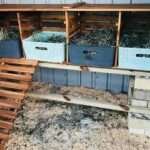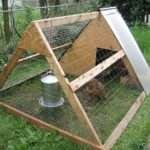Keeping a backyard flock of chickens can be a rewarding experience, providing you with a daily supply of fresh eggs and a glimpse into the fascinating world of these charming birds. However, along with the joys of chicken keeping come important responsibilities, one of which is maintaining a clean and hygienic living space for your feathered friends. In this article, we will explore the essential task of mucking out a chicken coop and shed light on the reasons why regular cleaning is crucial for the health and well-being of your chickens.
Understanding the Importance of Mucking Out a Chicken Coop:
The phrase “mucking out” refers to the process of removing soiled bedding, droppings, and debris from the chicken coop. It is a fundamental aspect of coop management that directly impacts the health and happiness of your flock. Let’s take a closer look at the reasons why this seemingly mundane chore should be given the utmost attention.
- Disease Prevention and Hygiene:
Chickens are generally hardy creatures, but they are not immune to diseases and infections. A dirty coop creates an ideal environment for harmful bacteria, viruses, and parasites to flourish. Ammonia fumes from accumulated droppings can also cause respiratory issues in chickens, particularly in enclosed spaces. Routine mucking out helps reduce the risk of disease transmission and maintains a hygienic living space for your feathered friends.
- Pest and Parasite Control:
Unchecked chicken droppings can attract a myriad of pests, including flies, rodents, and mites. Flies lay eggs in the droppings, leading to maggot infestations that are not only unsightly but also potentially harmful to chickens. Rodents, on the other hand, can carry diseases and pose a threat to both the chickens and their feed supplies. Mites and other external parasites can quickly multiply in a dirty coop, leading to discomfort and health issues for the birds. Regular mucking out disrupts these pests’ breeding cycles and reduces their presence in the coop.
- Enhanced Egg Production and Quality:
If you keep chickens primarily for their eggs, cleanliness plays a vital role in maximizing their productivity and quality. Hens are more likely to lay eggs in clean and comfortable nesting boxes. Dirty nesting areas can lead to cracked or soiled eggs, making the task of egg collection and cleaning more cumbersome. By maintaining a clean coop, you provide your hens with a conducive environment for laying, resulting in better-quality eggs for you and your family.
- Psychological Well-Being of Chickens:
Believe it or not, chickens can experience stress and discomfort if their living conditions are less than ideal. A clean and well-maintained coop contributes to a positive environment for your birds, reducing stress levels and promoting their overall well-being. Content and happy chickens are not only more pleasant to be around, but they are also more likely to exhibit natural behaviors, such as dust bathing and foraging, which are essential for their mental and physical health.
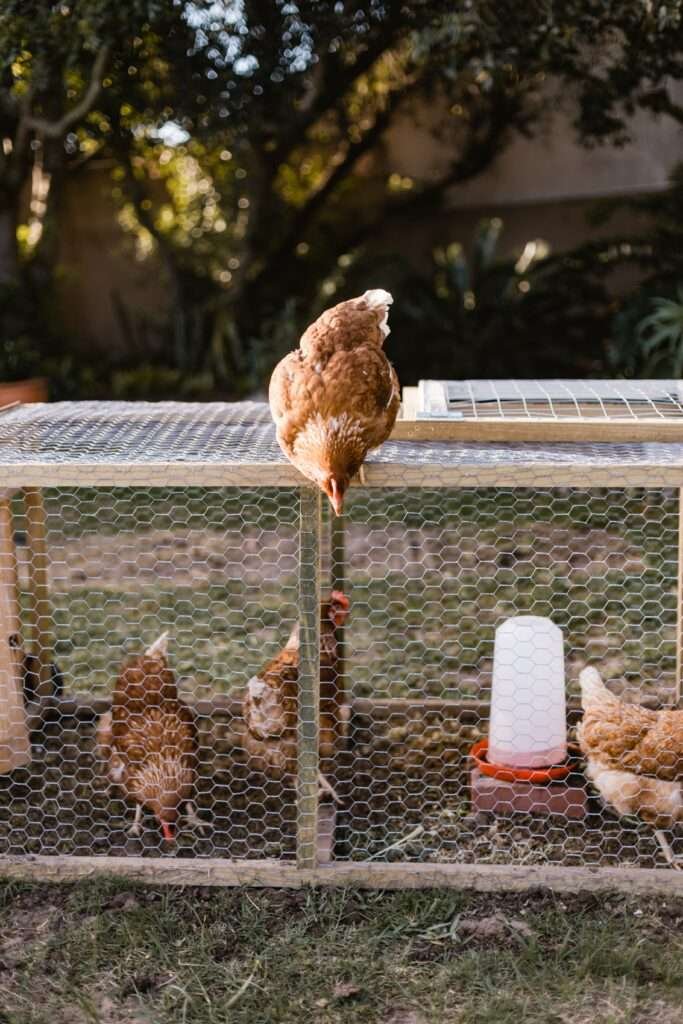
How Often Should You Muck Out a Chicken Coop?
Now that we understand the importance of mucking out a chicken coop, let’s explore how often this task should be performed. The frequency of cleaning largely depends on the size of your flock, the coop’s design, and the prevailing weather conditions. Let’s break it down to find the ideal cleaning schedule for your chicken coop.
- Flock Size and Coop Capacity:
The size of your flock is a primary determinant of how quickly the coop will accumulate waste. Larger flocks naturally produce more droppings and bedding waste, necessitating more frequent cleanings. As a general rule of thumb:
- For small flocks (up to 5 chickens): Aim for cleaning the coop once a week.
- For medium-sized flocks (6 to 12 chickens): Cleaning every 5 to 7 days is recommended.
- For larger flocks (more than 12 chickens): Consider cleaning every 3 to 4 days.
- Deep-Litter Method:
Some chicken keepers opt for the deep-litter method, which can extend the duration between cleanings. This approach involves regularly adding fresh bedding materials, such as straw or wood shavings, to the existing bedding without removing the old material. As the chickens scratch and mix the bedding, it breaks down and forms compost, releasing heat that helps to keep the coop warm during colder months. This method can be particularly useful during the winter when outdoor conditions may not permit frequent cleanings.
- Weather Conditions:
Weather plays a crucial role in determining how quickly the coop becomes soiled. During rainy seasons, wet bedding can quickly become a breeding ground for bacteria and create muddy conditions that are unsuitable for chickens. In contrast, hot and dry weather may lead to dustier conditions, requiring more frequent cleanings to mitigate respiratory issues. Adjust your cleaning schedule according to the prevailing weather conditions to ensure a clean and comfortable environment for your chickens.
- Regular Inspections:
Regardless of your planned cleaning schedule, it’s essential to conduct regular coop inspections to assess the cleanliness and identify potential issues. Look for areas where droppings tend to accumulate, as these spots may require extra attention during cleanings. Routine inspections also allow you to address any repairs or maintenance tasks promptly.
- Cleanliness During Molting Season:
During molting season, chickens naturally shed old feathers and grow new ones. This process puts additional stress on their bodies, and providing a clean and comfortable coop is crucial during this time. Clean out any accumulated feathers and droppings more frequently to support your chickens’ health during their molting period.
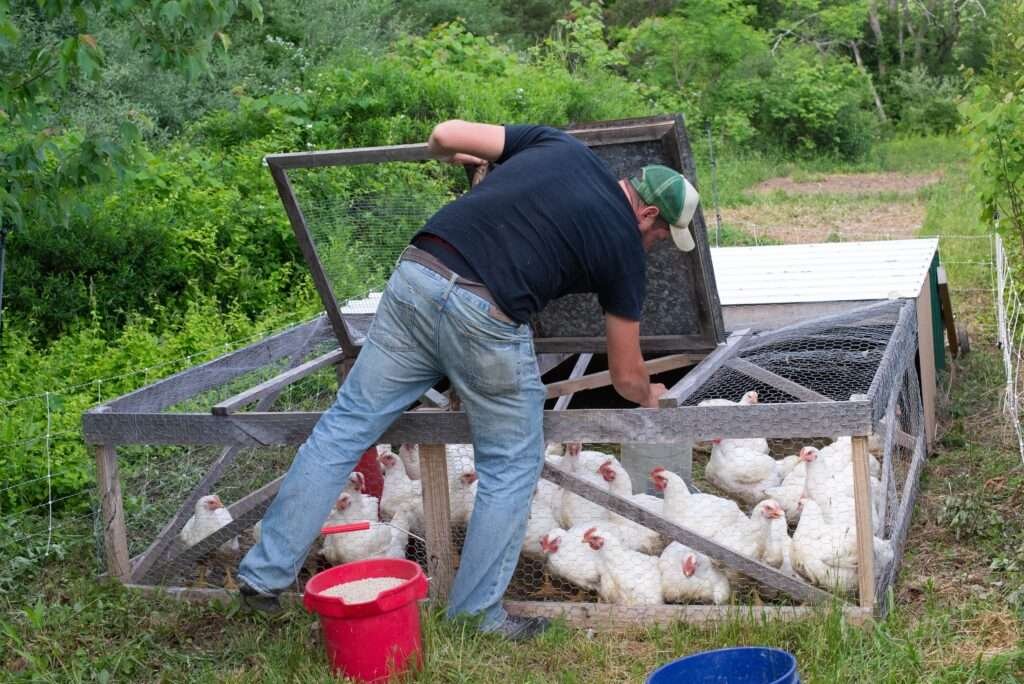
Step-by-Step Guide: Mucking Out a Chicken Coop
- Gather the Necessary Tools and Equipment:
Before you begin mucking out the coop, assemble all the tools and equipment you’ll need for the task. Some essential items include:
- Sturdy gloves: Protect your hands from contact with waste and potential pathogens.
- Shovel or rake: Use a shovel or rake to scoop out soiled bedding and droppings.
- Wheelbarrow or bucket: A wheelbarrow or bucket will help you transport the waste material to a compost pile or designated disposal area.
- Broom and dustpan: Use these tools to sweep up smaller debris and feathers.
- Cleaning solutions: Prepare a mild disinfectant solution to clean feeders, waterers, and other coop accessories.
- Fresh bedding: Have a supply of clean bedding material ready to replace the soiled bedding.
- Safely Handle Chickens During the Cleaning Process:
Before you begin cleaning, gently encourage the chickens to move out of the coop to a temporary holding area. It’s essential to ensure their safety during the process and minimize stress. Keep the temporary holding area well-ventilated and adequately shaded, especially during hot weather.
- Remove Feeders and Waterers for Cleaning:
Take out all the feeders, waterers, and other equipment from the coop. Empty and clean them thoroughly using warm water and a mild detergent or vinegar solution. Rinse them well and allow them to air dry before returning them to the coop. Clean feeders and waterers prevent the growth of mold, bacteria, and algae, ensuring your chickens have access to fresh and clean food and water.
- Scoop Out Soiled Bedding and Droppings:
Using a shovel or rake, begin scooping out the soiled bedding and droppings from the coop. Start from one end of the coop and work your way towards the exit, pushing the waste material into the wheelbarrow or bucket. Be thorough in removing all droppings, feathers, and debris to maintain a clean environment for your chickens.
- Address Hard-to-Reach Areas and Corners:
Pay special attention to hard-to-reach areas and corners where waste tends to accumulate. Use a smaller shovel or a hand rake to access these spaces more effectively. Properly cleaning these areas prevents the buildup of ammonia and harmful bacteria, ensuring your chickens’ respiratory health.
- Address Pests and Parasites During Cleaning:
While mucking out the coop, keep an eye out for signs of pests or parasites. Inspect nesting boxes, perches, and crevices for any indications of mites, lice, or other pests. If you encounter any, consider treating the affected areas with natural remedies or consult with a veterinarian for appropriate solutions.
- Replenish Bedding and Nesting Materials:
Once the coop is clean and free of waste, add a fresh layer of bedding material. Straw, wood shavings, or hay are popular choices for bedding. Provide your chickens with clean nesting materials, such as straw or shavings, in the nesting boxes. The bedding not only provides comfort but also absorbs moisture and odors.
- Clean and Disinfect Feeders, Waterers, and Other Equipment:
Before returning the feeders and waterers to the coop, clean and disinfect them thoroughly. Use a mild disinfectant solution to eliminate any harmful pathogens that may be present. A clean and sanitized feeding and watering area is crucial to maintaining your chickens’ health and preventing the spread of diseases.
- Return Chickens to the Coop:
Once the coop is clean and fresh bedding has been added, carefully return the chickens to their living space. Observe their behavior to ensure they adjust comfortably to the clean environment.
By following these steps and tips, you can efficiently muck out your chicken coop, providing your flock with a safe and clean living space. A well-maintained coop not only promotes the health and productivity of your chickens but also makes the task of coop cleaning more manageable.
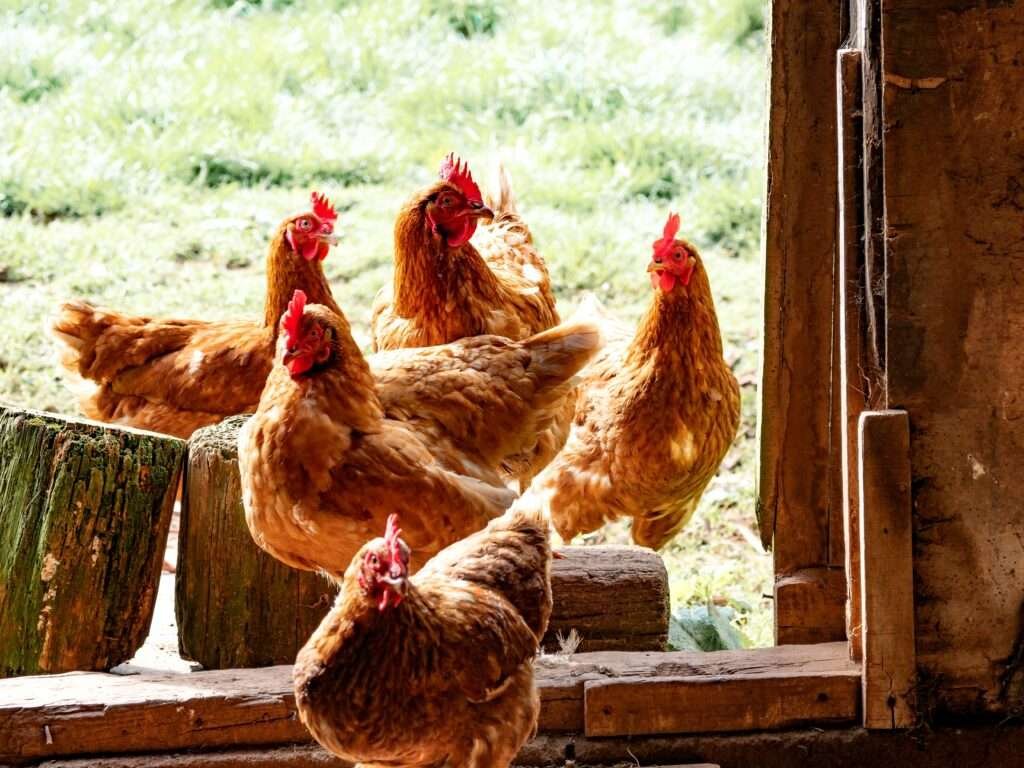
Helpful Hints and Tips for Effective Coop Mucking:
- Use Proper Personal Protective Equipment (PPE) during Cleaning: Mucking out a chicken coop involves handling waste materials that may contain harmful bacteria and parasites. Always wear sturdy gloves, a dust mask, and appropriate footwear to protect yourself from potential health hazards. Additionally, consider wearing old clothing that you can wash separately after cleaning.
- Utilize Natural Additives for Odor Control and Insect Repellence: Combat unpleasant odors in the coop by using natural additives such as diatomaceous earth or wood ash. These substances help absorb moisture and reduce ammonia levels. Herbs like lavender, mint, and rosemary can also act as natural insect repellents when placed in the coop or nesting boxes.
- Consider Deep-Litter Methods for Easier Maintenance: As mentioned earlier, the deep-litter method can be an excellent approach to reduce the frequency of coop cleanings. However, it’s essential to monitor the litter’s condition regularly. If it becomes excessively soiled or emits strong odors, it’s time for a thorough cleaning.
- Implement Rotational Grazing and Mobile Coops for Healthier Pastures: If your setup allows, consider using rotational grazing or mobile coops to allow chickens access to fresh pasture regularly. This practice not only reduces the impact of manure buildup in a confined area but also promotes healthier vegetation and soil.
Making Coop Mucking Easier and More Efficient:
- Optimize the Coop Layout for Easy Cleaning: When designing or modifying your coop, consider factors that make cleaning more manageable. Choose materials that are easy to clean, such as removable nesting boxes and roosts. Incorporate doors and access points that allow you to reach all areas of the coop with ease.
- Use Specialized Tools Designed for Coop Mucking: Invest in tools specifically designed for coop cleaning, such as long-handled scoops, rake-like scrapers, and deep litter scoops. These tools can save time and effort during the cleaning process.
- Involve Family or Friends for Quicker Clean-Up: Enlist the help of family members or friends to assist with coop cleaning. Many hands make light work, and it can be an enjoyable activity when shared with loved ones.
- Plan for Coop Cleaning During Suitable Weather Conditions: When possible, schedule coop cleanings during fair weather. Cleaning during dry conditions helps prevent mud and muck buildup, making the task more manageable.
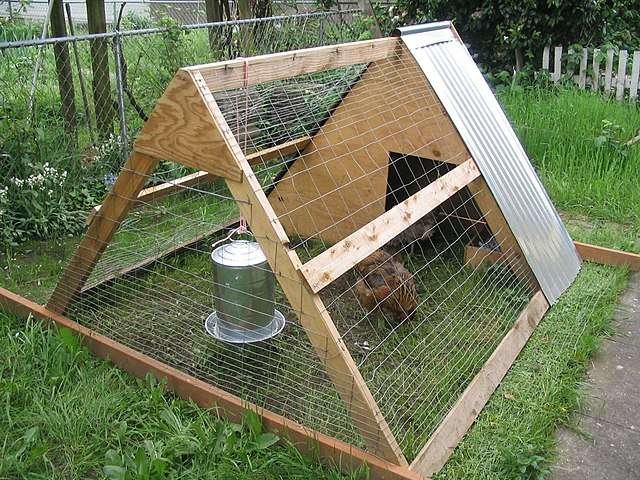
Frequently Encountered Challenges and Solutions:
- Dealing with Stubborn Odors and Ammonia Buildup: If your coop experiences persistent odors or high ammonia levels, ensure proper ventilation. Adding natural odor-absorbing materials like activated charcoal or baking soda to the bedding can also help neutralize strong smells.
- Managing Excess Moisture and Preventing Mud: Good drainage and proper coop siting are essential for preventing excess moisture and mud in the coop. Additionally, using a thick layer of dry bedding and avoiding overwatering plants around the coop can help minimize mud and wet conditions.
- Addressing Potential Predator Threats During Cleaning: Keep an eye out for potential predators while you clean the coop, as they may be attracted by the temporary disturbance. Ensure your chickens are safely contained in the temporary holding area, and be vigilant of any signs of predators in the vicinity.
Benefits Beyond Chicken Health: Environmental and Composting Advantages:
- Discuss the Positive Impact of Responsible Coop Mucking on the Environment: Proper coop mucking not only benefits your chickens but also contributes to environmental sustainability. It reduces the risk of water contamination and helps maintain a healthy ecosystem around your property.
- Explain How Chicken Waste Can Be Converted into Valuable Compost: Chicken manure is a valuable resource for composting. When properly managed and composted, chicken waste transforms into nutrient-rich compost that can be used to fertilize gardens and crops, promoting plant growth and reducing the need for synthetic fertilizers.
Mucking Out a Chicken Coop
Maintaining a clean and well-managed chicken coop is not only vital for the health and productivity of your flock but also a rewarding aspect of responsible chicken keeping. By routinely mucking out the coop, you provide your chickens with a comfortable, safe, and sanitary living space, reducing the risk of diseases, parasites, and stress-related issues.
Following the step-by-step guide, helpful hints, and tips provided in this article, you can create an efficient and enjoyable coop cleaning routine. Moreover, recognizing the environmental benefits and the potential for composting chicken waste underscores the significance of responsible coop management in sustainable backyard farming.
So, whether you are a seasoned chicken keeper or just starting on your poultry journey, remember that a clean coop is a happy coop, leading to healthier and happier chickens, and ultimately, more delicious eggs for your table. Take pride in caring for your feathered friends and enjoy the many benefits that come with being a diligent coop custodian.

